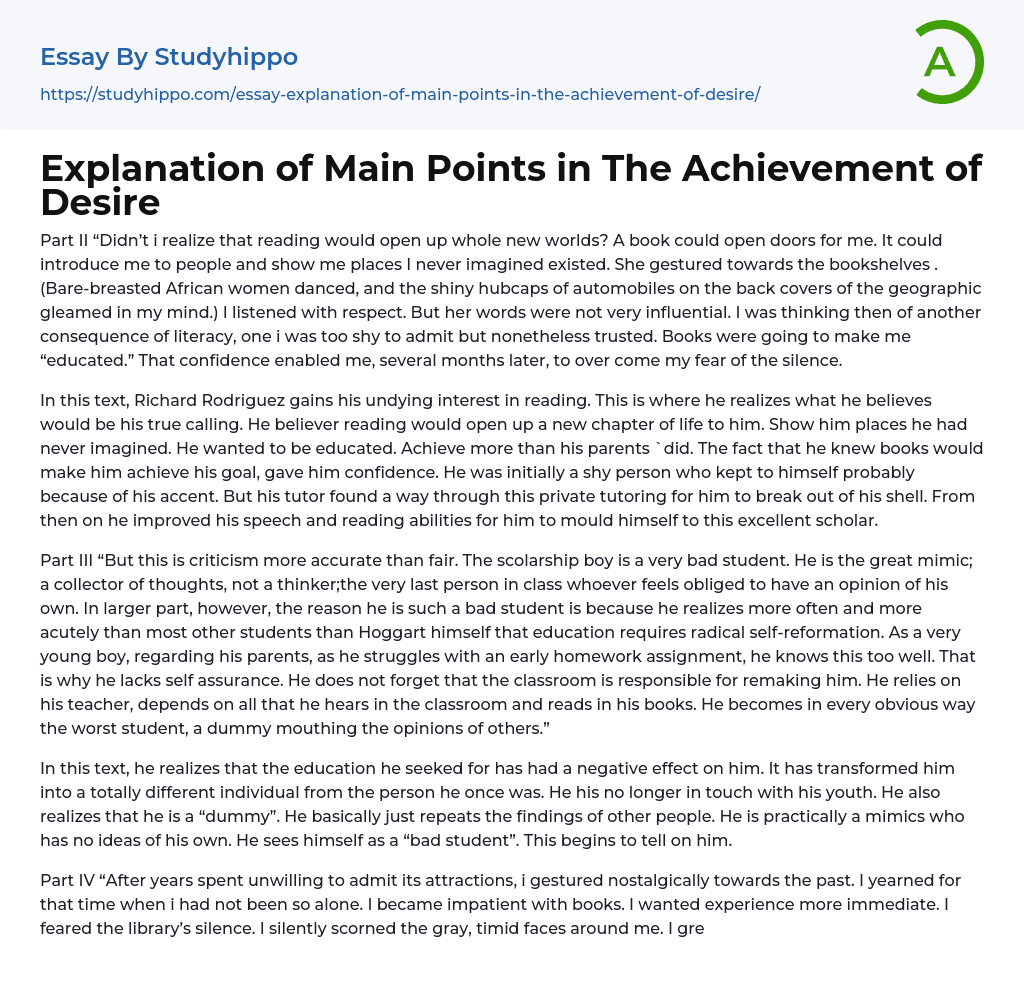

Explanation of Main Points in The Achievement of Desire Essay Example
Section II "Wasn't I aware that reading could unlock entirely new universes? A book had the power to pave the way for me. It could acquaint me with individuals and reveal places I'd never even dreamed of. She motioned towards the bookcases. (Images of African women dancing bare-chested, and the gleaming hubcaps of cars on the rear covers of the geography flashed in my mind.) I paid heed with reverence. However, her words didn't have much sway over me. I was contemplating another outcome of literacy at that time, one that I was reluctant to confess but still regarded as true. Books were set to make me "educated." That belief emboldened me to overcome my apprehension of silence a few months later.
Richard Rodriguez, in this narrative, cultivates a deep-seated passion for reading. He soon realizes how this is potentially his true vocation
.... He is hopeful that reading would lead him into new realms of life, transporting him to places beyond his imagination. His aspiration was to gain education, exceeding what his parents had achieved. The notion that books would facilitate him in realizing these aspirations served as a confidence booster. Initially, he was introverted, likely due to his distinct accent. However, his tutor effectively utilized private sessions to help him shatter his inhibitions. Thereafter, he honed his speaking and reading skills, gradually transforming into an exemplary scholar.
Segment III "However, calling this a critique might be more exact, though not necessarily fair. The academically inclined boy is not the best pupil. He is an excellent imitator; a gatherer of ideas, not an idea generator; he is almost always the last one in class who feels compelled
to articulate his own views. Yet, largely, his dismal academic performance stems from his acute realization, more often than Hoggart himself or most of his peers, that education necessitates profound self-transformation. From a young age, as he grapples with an initial homework task while observing his parents, he understands this all too well. This is why he lacks confidence in himself. He doesn't forget that the classroom plays a major role in reshaping him. He leans heavily on his teacher, relies on everything he learns in class and reads in his textbooks. He becomes, in every conspicuous way, the lousiest pupil, an empty shell echoing the views of others."
In the above extract, he acknowledges that the education he pursued has had an adverse impact on him. It has morphed him into an entirely different individual from who he used to be. He no longer identifies with his early youth. He also comes to terms with the fact that he is a "dummy". Essentially, he parrots what others have discovered. He is virtually an imitator devoid of original thought or concept. Viewing himself as a "bad student", this impression begins to weigh on him.
In Section IV, "Over the years, I hesitantly acknowledged my affinity for nostalgia and yearning for the past. I longed for the era when solitude wasn't my constant companion. Books had become less satisfying than they used to be - life's experiences seemed more compelling in comparison. The deafening quiet of the library filled me with dread. The subdued, hesitant faces that surrounded me ignited contempt within. My growing distaste for endless dissertations delving into genre and renaissance literature was escalating. (I could
almost hear the amusement of my relatives as they struggled to decipher its title.) There was an inexplicable thirst within me for something different. I persuaded myself that a life filled with passion was what I desired, perhaps a less contemplative life. Most importantly, I yearned to free myself from this enveloping solitude."
This passage marks the onset of his longing for the past and the individual he used to be - a boy who was always in the comforting presence of family, never experiencing loneliness. This feeling is now but a nostalgic memory. His enthusiasm for reading had diminished; he desired to experience life firsthand, as nothing can truly replicate authenticity. He was gradually awakening to the realities of his detached existence. The library, once a sanctuary, now only heightened his disdain, as did the detached faces that frequented it. He craved an exuberant and spirited lifestyle, with companionship at its crux; he yearned not to be the solitary figure he had become.
- Classroom Management essays
- Academia essays
- Higher Education essays
- Language Learning essays
- Studying Business essays
- Education System essays
- Study essays
- First Day of School essays
- Scholarship essays
- Pedagogy essays
- Curriculum essays
- Coursework essays
- Studying Abroad essays
- Philosophy of Education essays
- Purpose of Education essays
- Brainstorming essays
- Educational Goals essays
- Importance Of College Education essays
- Brown V Board of Education essays
- The Importance Of Higher Education essays
- Online Education Vs Traditional Education essays
- Academic And Career Goals essays
- Academic Integrity essays
- Brown Vs Board Of Education essays
- Distance learning essays
- Technology in Education essays
- Vocabulary essays
- Writing Experience essays
- Importance of Education essays
- Early Childhood Education essays
- Academic Degree essays
- Academic Dishonesty essays
- School Uniform essays
- Academic writing essays
- Cheating essays
- Bachelor's Degree essays
- MBA essays
- College Life essays
- Grade essays
- Diploma essays
- Phonology essays
- Sentence essays
- Filipino Language essays
- Pragmatics essays
- Millennium Development Goals essays
- History Of Education essays
- Graduate School essays
- Middle School essays
- School essays
- Special Education essays



